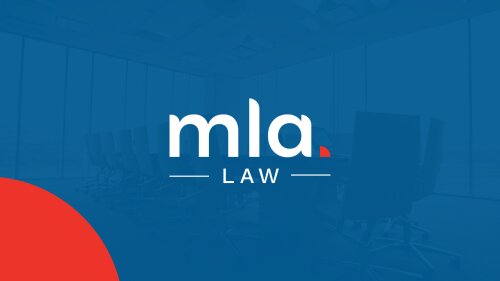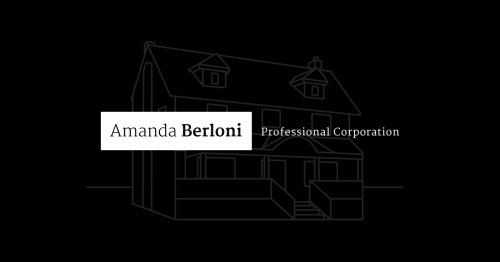Best Office Solutions Lawyers in Greater Sudbury
Share your needs with us, get contacted by law firms.
Free. Takes 2 min.
List of the best lawyers in Greater Sudbury, Canada
About Office Solutions Law in Greater Sudbury, Canada
In Greater Sudbury, "Office Solutions" refers to a broad field encompassing the acquisition, leasing, operation, and management of office spaces, as well as the supply of products and services necessary for business operations. This area of law touches on commercial real estate, business contracts, employment standards, data privacy, and intellectual property as they relate to modern offices. Due to the evolving nature of business technology and the legal environment, companies and individuals in Greater Sudbury often seek legal advice to ensure compliance with local, provincial, and federal regulations while optimizing their office-related solutions.
Why You May Need a Lawyer
There are various scenarios in which you might require legal support regarding Office Solutions in Greater Sudbury, including:
- Negotiating and drafting office lease or rental agreements
- Reviewing or creating contracts with office service providers
- Navigating zoning and land use regulations for office locations
- Ensuring compliance with workplace health and safety standards
- Resolving disputes with landlords, tenants, or service vendors
- Adhering to data privacy and cybersecurity regulations in office environments
- Dealing with employment issues and staffing within office operations
- Protecting intellectual property such as business processes or branding displayed in-office
- Managing transitions to hybrid or remote office solutions
Local Laws Overview
Greater Sudbury, located in Ontario, is governed by federal, provincial, and municipal laws that impact office solutions. Key legal areas include:
- Commercial Tenancies Act (Ontario): Governs office lease agreements, tenant rights, and obligations.
- Local Zoning Bylaws: Municipal rules determine permissible office uses and locations.
- Occupational Health and Safety Act: Outlines employer responsibilities for maintaining safe office environments.
- Employment Standards Act: Details minimum wage, hours of work, and workplace standards.
- Privacy Legislation: Such as PIPEDA, regulating the collection and handling of client or employee data.
- Accessibility for Ontarians with Disabilities Act (AODA): Mandates accessible office environments.
Understanding these laws ensures your office practices in Greater Sudbury are compliant and risk-averse.
Frequently Asked Questions
What should I look for in a commercial office lease agreement?
Look for clear terms regarding rent, renewal options, maintenance responsibilities, permitted use, and termination clauses. Legal review ensures your interests are protected.
Are there specific zoning laws affecting office locations in Greater Sudbury?
Yes, municipal zoning bylaws restrict where offices can operate. Verify the property's zoning designation before entering into a lease or purchase agreement.
How do I ensure my office is compliant with workplace health and safety standards?
Adopt practices that meet Ontario's Occupational Health and Safety Act requirements, including regular safety inspections and proper training for employees.
What are my responsibilities regarding employee privacy in the office?
You must follow federal and provincial privacy laws-such as PIPEDA-regarding the collection, storage, and sharing of employee and client information.
Can I make alterations to a leased office space?
Typically, alterations require the landlord’s written approval. Lease agreements often include provisions about permissible alterations and restoration obligations at lease end.
What happens if there is a dispute with my office landlord?
Disputes can often be resolved through negotiation or mediation. If unresolved, legal action based on your lease agreement and the Commercial Tenancies Act may be necessary.
Do I need to provide accessibility features in my office?
Yes, the AODA requires businesses to accommodate employees and visitors with disabilities. Non-compliance can result in penalties.
How do I protect my intellectual property used in my office?
Register trademarks, copyrights, or patents as appropriate. Ensure contracts with third parties include clauses to safeguard your intellectual property rights.
What documents should I keep for my office solution business?
Maintain copies of all contracts, lease agreements, invoices, employee records, workplace policies, and correspondence related to legal and compliance matters.
Can I sublet my office space in Greater Sudbury?
Subletting is usually possible with landlord approval. Review your lease agreement for specific clauses and always get subletting terms in writing.
Additional Resources
Several resources are available for those seeking legal guidance on Office Solutions in Greater Sudbury:
- Sudbury & District Law Association: Professional network and lawyer referral services
- Greater Sudbury (City) Building Services: Information on zoning and permits
- Ontario Ministry of Labour, Immigration, Training and Skills Development: Guidance on occupational health and safety
- Small Business Centre - Greater Sudbury: Start-up support and business development advice
- Ontario Bar Association: Tools for finding legal experts in commercial and real estate law
- Legal Aid Ontario: Support for eligible individuals and small businesses
Next Steps
If you need legal assistance regarding Office Solutions in Greater Sudbury:
- Identify your specific legal issue (leases, contracts, compliance, etc.).
- Gather all relevant documentation, including agreements and correspondence.
- Consult with a lawyer experienced in office solutions, commercial real estate, or business law in Ontario.
- Discuss your options and potential strategies with your legal advisor.
- Stay proactive about compliance and regularly review your office practices and contracts.
Taking these steps will help your office operations remain secure, compliant, and ready for future growth in Greater Sudbury.
Lawzana helps you find the best lawyers and law firms in Greater Sudbury through a curated and pre-screened list of qualified legal professionals. Our platform offers rankings and detailed profiles of attorneys and law firms, allowing you to compare based on practice areas, including Office Solutions, experience, and client feedback.
Each profile includes a description of the firm's areas of practice, client reviews, team members and partners, year of establishment, spoken languages, office locations, contact information, social media presence, and any published articles or resources. Most firms on our platform speak English and are experienced in both local and international legal matters.
Get a quote from top-rated law firms in Greater Sudbury, Canada — quickly, securely, and without unnecessary hassle.
Disclaimer:
The information provided on this page is for general informational purposes only and does not constitute legal advice. While we strive to ensure the accuracy and relevance of the content, legal information may change over time, and interpretations of the law can vary. You should always consult with a qualified legal professional for advice specific to your situation.
We disclaim all liability for actions taken or not taken based on the content of this page. If you believe any information is incorrect or outdated, please contact us, and we will review and update it where appropriate.










